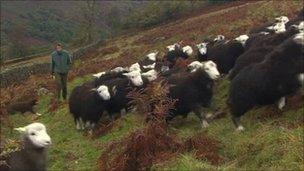CAP reform: Shepherd and steward of the land
- Published

English Lake District sheep farmer Andrew Harrison depends on his subsidy
UK ministers will regard Wednesday's proposals for Common Agricultural Policy (CAP) reform as inadequate.
At a time when the government in Westminster is slashing public spending, they argue that the budget for farm subsidies also needs to be dramatically cut.
Paying for the CAP costs the average British family of four some £426 (488 euros; $666) a year.
And while ministers have yet to suggest exactly how much it should be cut by, clearly they believe that the reduction should be more than the proposed figures emerging from Brussels.
The changing economic climate means it is increasingly difficult to explain to taxpayers why rich landowners with profitable farms receive so much public money. The Duke of Westminister, for instance, received a reported £5.8m pounds over the 10 years to 2009.
But the UK does support EU proposals to make more farm subsidies less dependent on the food a farmer produces, and more dependent on "public goods" - for instance, on how farmers treat biodiversity, natural habitats and the landscape.
'No profit'
Minister of State for Agriculture and Food Jim Paice said: "Yes we want to spend less on the CAP and less on the whole European budget.
"But whatever the budget is, it is also the overall structure of the CAP that really matters - how you distribute it either as a direct payment for doing very little or actually targeting for things people really want to pay for."
As an example, ministers believe that subsidy should be channelled to hill farmers who rear sheep in some of Britain's most beautiful and rugged landscapes.
Their sheep are essential to maintain the countryside, but making a living would be impossible without the £20,000 or so they receive annually in farm subsidy.
Andrew Harrison is a hill farmer in the Lake District in North-West England. He loves his job and the hard work that comes with it.
However, producing lamb and wool in these conditions can barely cover the rent and other costs of running his business. The entire profit margin for many upland farmers is what they receive in EU subsidy.
For Mr Harrison it is all very simple. He says that without his EU payment he could not continue.
"Well without it, basically I would have to leave the key in the door and walk away," he says.
"There wouldn't be any farming in the uplands without the subsidy or something to substitute for it."
The British government's vision of the future would continue to see farmers like Andrew Harrison receive public money for his work as a steward of the landscape.
And there would be less money linked to food production - which sees some of the biggest, most industrialised, most profitable farms qualifying for the EU subsidy.
- Published12 October 2011
- Published1 July 2013